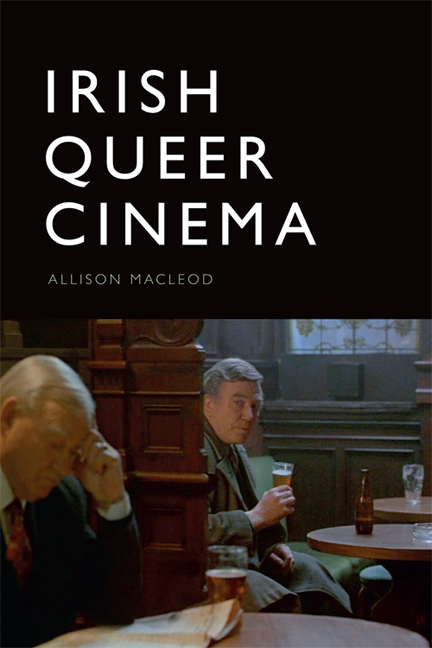Book contents
- Frontmatter
- Contents
- List of Figures
- Acknowledgements
- 1 Queerly National and Nationally Queer: Paradoxes of an Irish Queer Cinema
- 2 Mapping Ireland’s Queer Films
- 3 Re-imagined Kinship and Failed Communities
- 4 The Contested Space of the Irish Pub
- 5 Compartmentalised Cosmopolitans and Rigid Fluidity
- 6 The Queerly Productive Constraints of Rural Space
- 7 Queer Mobilities and Disassociated Masculinities
- 8 Contested Belongings within Diasporic Space
- 9 The Irish Queer Short Film
- 10 Concluding Remarks
- Select Filmography
- Bibliography
- Index
8 - Contested Belongings within Diasporic Space
Published online by Cambridge University Press: 04 May 2021
- Frontmatter
- Contents
- List of Figures
- Acknowledgements
- 1 Queerly National and Nationally Queer: Paradoxes of an Irish Queer Cinema
- 2 Mapping Ireland’s Queer Films
- 3 Re-imagined Kinship and Failed Communities
- 4 The Contested Space of the Irish Pub
- 5 Compartmentalised Cosmopolitans and Rigid Fluidity
- 6 The Queerly Productive Constraints of Rural Space
- 7 Queer Mobilities and Disassociated Masculinities
- 8 Contested Belongings within Diasporic Space
- 9 The Irish Queer Short Film
- 10 Concluding Remarks
- Select Filmography
- Bibliography
- Index
Summary
This chapter interrogates the dynamics of diaspora in relation to Irish queer masculinity in 2by4 (Smallhorne 1998) and Borstal Boy (Sheridan 2000), exploring how the queer male subject's physical displacement from Ireland and process of settling down elsewhere is negotiated in relation to his sexuality. Nationalist discourses have historically positioned homosexuality as a foreign contaminant or form of national treason, defining post-colonial Ireland as inherently heteronormative by imagining homosexuality as occurring outside the nation-state. As Ed Madden (2010) and Tina O’Toole (2013) have argued, this positioning of queer sexuality as outside the nation has resulted in cultural representations of sexual desire which posit migration out of Ireland as central to the Irish coming out narrative; subsequently, as Madden asserts, Irish queer sexuality itself constitutes a diasporic project.
Yet even as national belonging may appear to preclude sexual becoming, social identities and sexual behaviours continue to be policed within the diasporic context. Drawing from the memoirs of Italian-American author Mary Cappello (Night Bloom, 1998), where she describes her struggles with reconciling her lesbianism with the sex and gender norms set out by her Italian immigrant family, Anne-Marie Fortier argues that for Cappello ‘ethnicity is an obstacle in her queer becoming’ (2003: 7). In his study of Irish diasporic literature Madden notes similar struggles for Irish queer emigrants. He cites Máirtín Mac an Ghaill's study on young Irish gay men living in London in the 1990s (‘Irish Masculinities and Sexualities in England’, 1996) and Anne Maguire's autobiographical account of being a lesbian and an Irish emigrant out of place in both Ireland and New York (‘The Accidental Immigrant’, 1995) as evidence of how Irish diasporic communities continue to maintain ethnic boundaries by policing sexual behaviours. Thus, ‘even when located elsewhere, Irish queer sexuality could be rendered other, not-Irish’ (Madden 2010: 177; original emphasis). Ongoing conflicts surrounding LGBTQ activists’ right to march under their own banners in the Boston and New York St Patrick's Day parades further reveal how heterosexuality continues to be a powerful symbol of Irish national identity used to police the boundaries of cultural territory and how dominant social norms continue to shape constructions of Irishness even within the diasporic context.
- Type
- Chapter
- Information
- Irish Queer Cinema , pp. 128 - 145Publisher: Edinburgh University PressPrint publication year: 2018



